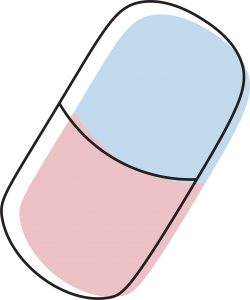 Antibiotics are prescribed to cure inflammatory diseases such as urinary tract infections or pneumonia. Usually they are very effective. However, like for all medication, the use of antibiotics can give rise to toxic side effects or hypersensitivity reactions (allergic reactions).
Antibiotics are prescribed to cure inflammatory diseases such as urinary tract infections or pneumonia. Usually they are very effective. However, like for all medication, the use of antibiotics can give rise to toxic side effects or hypersensitivity reactions (allergic reactions).
Toxic side effects are reactions that are related to both the working mechanism and the dosage of the drug and are predictable. Antibiotics are given when someone has a bacterial infection to kill the bacteria. The problem is that these antibiotics may also kill or diminish the bacteria living in our gut that are actually beneficial to us and subsequently cause reactions such as diarrhea. Most of the times side effects are bothersome but not life threatening. As these reactions are predictable and well-known, no allergy testing is necessary.
Hypersensitivity reactions are reactions that are unpredictable and that are not dose related. If the doctor can demonstrate an involvement of the immune system by a positive skin or laboratory test, the reaction is called an allergy. If an allergic reaction can not be demonstrated by skin test or laboratory test, although the clinical picture is identical and allergy-like, the reaction is called a non-allergic hypersensitivity reaction. These reactions can be severe and even life threatening.
In allergic or non-allergic hypersensitivity reactions the patient may also react to other antibiotics belonging to the same group or sharing a similar structure because of a so called cross reactive mechanism. If an allergic reaction is suspected, skin testing and laboratory tests can be useful for the identification of the culprit drug.
If you or your doctor think you had a hypersensitivity reaction to an antibiotic, it is important to assess whether it truly was a hypersensitivity reaction or not. If you are allergic or had a non-allergic hypersensitivity reaction, you need an allergological workup and advice by a drug allergy expert as to which antibiotics you can safely take as alternatives, should you develop an infection.
